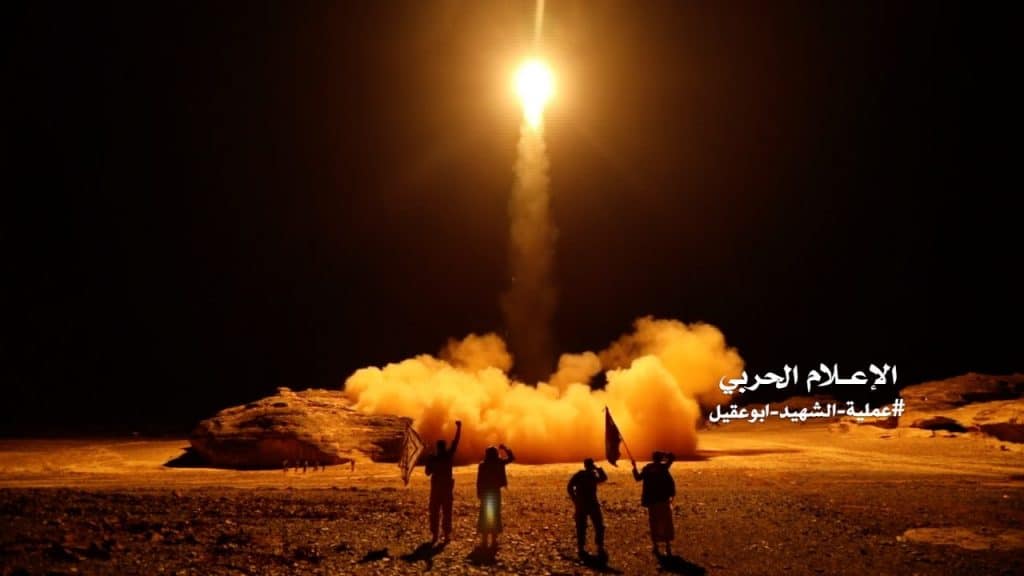
On Monday morning, Abu Dhabi came under ballistic missile attack by Yemen’s Houthis, according to a statement by the United Emirates Ministry of Defense.
“The Ministry of Defense announced on Monday that its air defense forces had intercepted and destroyed two ballistic missiles targeting the UAE, which were fired by the Houthi terrorist militia. The ministry confirmed that there were no casualties resulting from the attack, as the fragments of the ballistic missiles fell in different areas around the UAE capital, Abu Dhabi,” the statement read.
A statement from the Saudi government also confirmed it “recently” came under assault, which resulted in the injury of two civilians.
“The Kingdom of Saudi Arabia has condemned the repeated attacks by the Iran-backed terrorist Houthi militia on civilian objects and vital installations in the south of the Kingdom and Abu Dhabi, most recently targeting the city of Dhahran Al-Janub and the industrial zone in the southwestern Jazan that resulted in two minor injuries to residents of Bangladeshi and Sudanese nationalities,” the statement read.
Yahya Sare’e, a spokesperson for the Houthis, confirmed in a Twitter statement the militant group targeted Abu Dhabi and Saudi Arabia.
“In response to the escalation of the US-Saudi-Emirati aggression and its crimes against our dear people. The missile force and the air force carried out a large-scale military operation,” Sare’e stated.
Sare’e also added that Al-Dhafra Air Base, which hosts the U.S. military’s 380th Air Expeditionary Wing, was targeted with ballistic missiles.
The U.S. Air Force “intervened” in the offensive and “successfully reacted to multiple inbound threats during an attack near Abu Dhabi,” according to a report in The New York Times.
Monday’s ballistic missile strike was the second significant operation launched by the Houthis against the Emirates in one week. The previous week’s assault targeted several sites in the UAE including Abu Dhabi International Airport that resulted in the killing and wounding of civilians.
In recent weeks, the Saudi-led coalition increased it attacks against Houthi-controlled territory in Yemen. Additionally, the coalition reportedly killed Houthi leader Abdullah Qassem al-Junaid, who headed the College of Aviation and Defense, according to an Al-Ayn report.
In response to retaliatory strikes for last week’s UAE attack, Houthi spokesperson Yahya Sare’e hinted in a tweet that a response against the UAE may be imminent.
“After the crimes committed by US-Saudi-UAE aggression today against Yemeni people, we advise the foreign companies in Emirates to leave because they invest in an unsafe country and the rulers of this country continue in their aggression against Yemen,” Sare’e stated.
The UAE has largely avoided strikes since its involvement in the Yemen conflict, but a few notable operations have been claimed by the Houthis inside Emirati territory.
In 2018, the Houthis claimed an attack using a Samad-3 drone against Abu Dhabi International Airport.
The previous year, the Houthis claimed responsibility for assaulting the Barakah nuclear reactor in the Gharbiya region of Abu Dhabi.
It’s unlikely these high-profile operations against the Emirates would have occurred without approval by the Houthis chief backer, Iran. Much like the Islamic Republic’s history of using its proxies in Iraq to attack American-led coalition bases, it is using a similar game plan in Yemen by supplying the Houthis with offensive armaments to use against Saudi Arabia and at an increasing rate against the Emirates.







